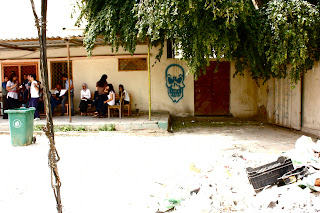Creeping on Gropius from the freeway
Creeping on Gropius from a checkpoint
Creeping on Gropius from across the Tigress
Creeping on Gropius from a textbook (same building as image 1 + 3)
Like the unreachable crush, I have creeped on this building since I was back home in LA. Designed by Walter Gropius, and one of the notable pieces of architecture that defines the built environment of the 50s and 60s, these are the best images that I was able to shoot of Baghdad University. Due to obvious reasons, aka safety, non-students and faculty are not allowed to enter the campus. I met connections within the last days who could grant me access, but time was not on my side.
Since you last heard from Love and Fashism 18 months ago, I completed a thesis on the relation between the built environment, politics, and national identity in Iraq: 1918 to present. I concluded that, throughout the eras, design style has been representative of the state of Baghdad's politics.
Architecture in Iraq must be considered in a large historical trajectory—from colonialism to modernism to the rise of Iraq as a nation state to today’s postcolonial search for local identity. Architecture, often iconic of Iraq’s national identity, has been closely tied to Iraq’s political climate since the country’s birth in 1921, which was the topic of my research paper. In Iraq, the official design emphasis wavered from stressing Iraq’s pan-Arab ties to stressing an identity concentrated more on Iraq’s Mesopotamian heritage. However, between the wavering design languages, the rise of the political monument under Saddam, and the wars that destroyed much of the built environment, Iraq sits in an architectural design vacuum today.
Like architecture, current Iraqi national identity also falls in a vacuum. One cannot characterize Iraq as a people, with the far right, the far left, and the majority uninterested in polarized politics. What ties those in the all three political ideologies together is the most human form of feeling and experience, and namely, loss—the point at which my thesis design began on.
I intend to continue this research in the fall--but that's a whole other story. For now, here's an amazing article on the current built environment of Iraq: http://www.nytimes.com/2011/05/15/world/middleeast/15baghdad.html?_r=1
![love and [fash]ism.](https://blogger.googleusercontent.com/img/b/R29vZ2xl/AVvXsEhUf2Twcw8pAEafDMp4jHzK7tUW6rNBS7dstZC-NzrtWu5w79vjNQWTKPlErXlpZoHtEwe0BIgmM-bw7xhhfMnRhefRVsXdJGsDAawCYd0nWE_9WniQK938vk2Ls64X810lMNLTydoud_Y/s1600/LAF_Title2.jpg)













































